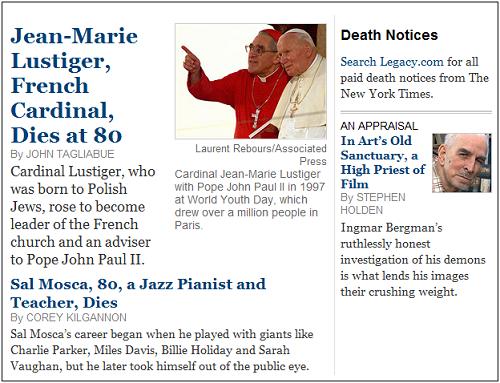Quotations on Realism
and the Problem of Universals:
"It is said that the students of medieval Paris came to blows in the streets over the question of universals. The stakes are high, for at issue is our whole conception of our ability to describe the world truly or falsely, and the objectivity of any opinions we frame to ourselves. It is arguable that this is always the deepest, most profound problem of philosophy. It structures Plato's (realist) reaction to the sophists (nominalists). What is often called 'postmodernism' is really just nominalism, colourfully presented as the doctrine that there is nothing except texts. It is the variety of nominalism represented in many modern humanities, paralysing appeals to reason and truth."
— Simon Blackburn, Think, Oxford University Press, 1999, page 268
"You will all know that in the Middle Ages there were supposed to be various classes of angels…. these hierarchized celsitudes are but the last traces in a less philosophical age of the ideas which Plato taught his disciples existed in the spiritual world."
— Charles Williams, page 31, Chapter Two, "The Eidola and the Angeli," in The Place of the Lion (1933), reprinted in 1991 by Eerdmans Publishing
For Williams's discussion of Divine Universals (i.e., angels), see Chapter Eight of The Place of the Lion.
"People have always longed for truths about the world — not logical truths, for all their utility; or even probable truths, without which daily life would be impossible; but informative, certain truths, the only 'truths' strictly worthy of the name. Such truths I will call 'diamonds'; they are highly desirable but hard to find….The happy metaphor is Morris Kline's in Mathematics in Western Culture (Oxford, 1953), p. 430."
— Richard J. Trudeau, The Non-Euclidean Revolution, Birkhauser Boston, 1987, pages 114 and 117
"A new epistemology is emerging to replace the Diamond Theory of truth. I will call it the 'Story Theory' of truth: There are no diamonds. People make up stories about what they experience. Stories that catch on are called 'true.' The Story Theory of truth is itself a story that is catching on. It is being told and retold, with increasing frequency, by thinkers of many stripes…. My own viewpoint is the Story Theory…. I concluded long ago that each enterprise contains only stories (which the scientists call 'models of reality'). I had started by hunting diamonds; I did find dazzlingly beautiful jewels, but always of human manufacture."
— Richard J. Trudeau, The Non-Euclidean Revolution, Birkhauser Boston, 1987, pages 256 and 259
Trudeau's confusion seems to stem from the nominalism of W. V. Quine, which in turn stems from Quine's appalling ignorance of the nature of geometry. Quine thinks that the geometry of Euclid dealt with "an emphatically empirical subject matter" — "surfaces, curves, and points in real space." Quine says that Euclidean geometry lost "its old status of mathematics with a subject matter" when Einstein established that space itself, as defined by the paths of light, is non-Euclidean. Having totally misunderstood the nature of the subject, Quine concludes that after Einstein, geometry has become "uninterpreted mathematics," which is "devoid not only of empirical content but of all question of truth and falsity." (From Stimulus to Science, Harvard University Press, 1995, page 55)
— S. H. Cullinane, December 12, 2000
The correct statement of the relation between geometry and the physical universe is as follows:
"The contrast between pure and applied mathematics stands out most clearly, perhaps, in geometry. There is the science of pure geometry, in which there are many geometries: projective geometry, Euclidean geometry, non-Euclidean geometry, and so forth. Each of these geometries is a model, a pattern of ideas, and is to be judged by the interest and beauty of its particular pattern. It is a map or picture, the joint product of many hands, a partial and imperfect copy (yet exact so far as it extends) of a section of mathematical reality. But the point which is important to us now is this, that there is one thing at any rate of which pure geometries are not pictures, and that is the spatio-temporal reality of the physical world. It is obvious, surely, that they cannot be, since earthquakes and eclipses are not mathematical concepts."
— G. H. Hardy, section 23, A Mathematician's Apology, Cambridge University Press, 1940
|




 .
.












